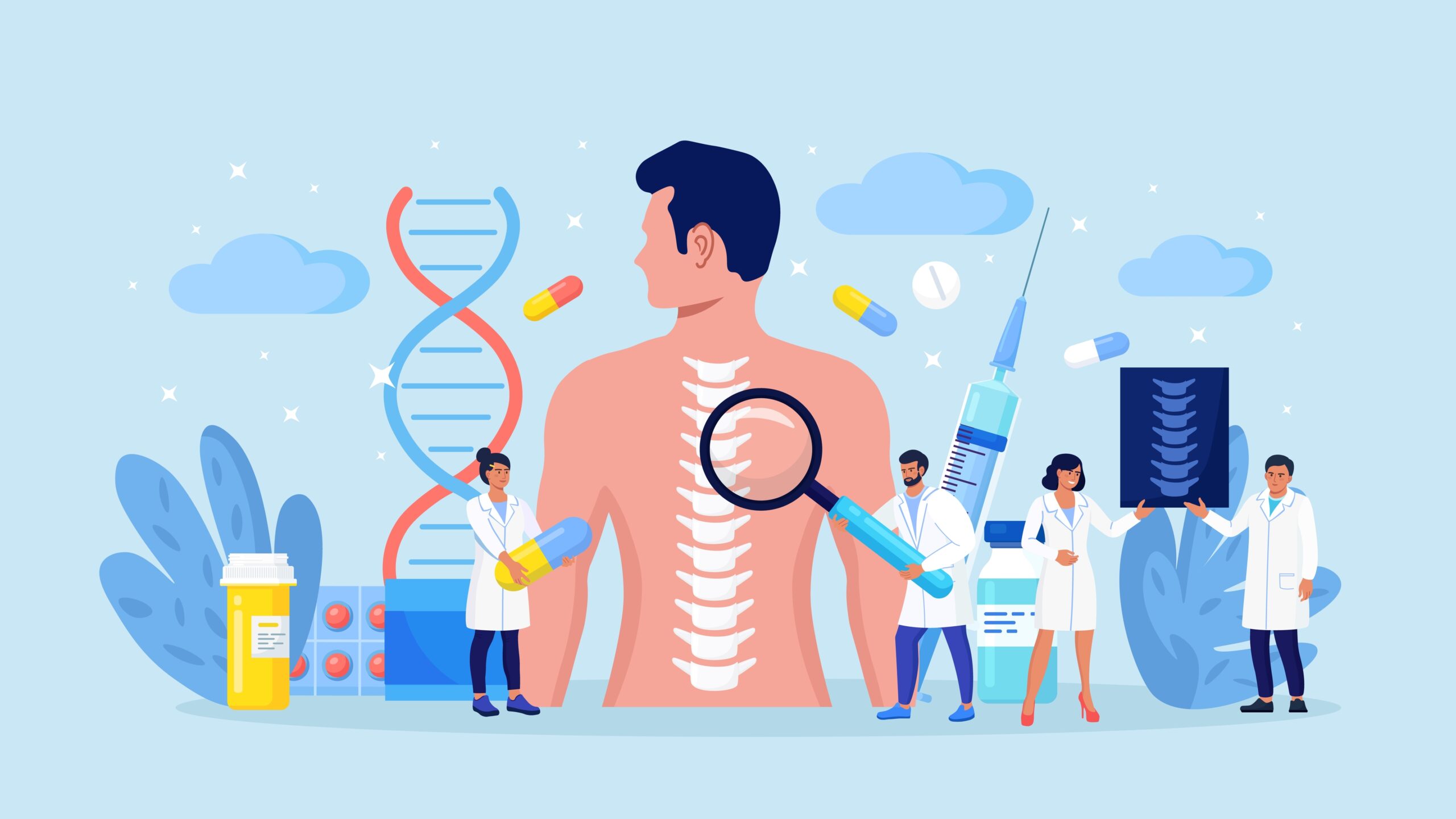Chronic pain or long-term pain is defined as pain lasting for more than 3-6 months despite medication or treatment. This may be secondary to an underlying condition such as osteoarthritis, rheumatoid arthritis, endometriosis or inflammatory bowel disease. More commonly, chronic pain happens without any obvious cause, we call this primary chronic pain.
Statistics suggests that up to 1 in 3 people in Hong Kong suffers from some form of chronic pain. This does not only impact one’s physical health but also their mental wellbeing.
What is Pain?
Our brain and nerves that branches out from our spine, makes up our central nervous system. Imagine the brain being the control headquarter, analyzing any incoming messages carried by the nerves. Its job is to analyze information received from the outside world and trigger an “alarm system” if it senses something incoming being dangerous. This will be perceived as pain. However, at times, the brain’s misinterprets these signals, and the brain may continue to send out pain signals.
Pain is a very subjective symptom. You may find people describe their pain as aching, sharp, burning, dull, stabbing, shooting or like an electric shock. Pain can be intense despite no obvious cause found. However, one thing we do know is that the pain is real and can be very complex
Types of Pain:
- Neuropathic Pain- nerve pain such as shingles, sciatica, diabetic neuropathy
- Muscle or Joint pain- from strained or pulled muscle or ligament
- Mechanical/ Compression Pain- spinal cord compression, spinal disc degeneration, pressure from a mass such as tumor or benign growth.
- Inflammatory pain- infection, arthritis, tissue injury.
- Chronic widespread pain -Fibromyalgia, complex regional pain syndrome, chronic primary headaches
How is Chronic Pain Diagnosed
Your GP will take a detailed medical history and examine you to eliminate possible secondary causes to your pain.
They may also discuss various diagnostic tests if indicated to rule out organic causes for your pain.
How to treat Chronic pain.
The key to treatment is to identify what is causing the pain. However, sometimes this may not be obvious in chronic pain. The most effective approach entails a multidisciplinary team involving GP’s, physiotherapists and psychologist to formulate a tailored treatment plan with you. This may involve medication, personally tailored lifestyle program and therapies.
Medicines for Chronic Pain
- Neuropathic agents- eg. Pregabalin, gabapentin
- Non-opioid based analgesics eg. oral or topical non-inflammatory analgesics (NAIDs), topical capsaicin, topical lidocaine
- Opioid analgesics- there are so far no evidence to support using opioid based medicine to manage chronic pain, on the contrary evidence shows it can lead to dependance issues.
- Antidepressants- eg. amitriptyline, sertraline, citalopram. This can be useful to manage concurrent anxiety and mood issues caused by physical pain and its effect on one’s quality of life.
What can I do?
- Planning your day and pacing yourself– planning ahead where and what you are going to do, avoid pushing yourself too hard.
- Learn to relax– when your body is relaxed it releases endorphins which block pain receptors. Meditation can be very useful way to de-stress.
- Taking regular enjoyable exercises– not only does it keep your activity level up but psychologically it can also improve your mood.
- Taking pain medicines– tablets on their own are seldom effective. However, taken alongside a management plan agreed between your doctor and physiotherapist can have great additional value.
- Talking to others– this can be with your family, friends or even a psychologist. Sharing experiences or talking about your feelings and symptoms can have a beneficial outcome to your perception to pain.
- Enjoyment– try to do activities that makes you happy. Endorphins are released by the brain when one feels happy and this is a very effective hormone to block pain receptors.
- Transcutaneous Electric Nerve Stimulation (TENS) –This machine releases a small current of electricity to interrupt the pain signals running between the brain and spinal nerves. The idea behind this is similar to you rubbing over the painful part of your body to make it feel better. The machine can be bought from our pharmacy.
- Acupuncture– many people find this form of alternative medicine works very well adjunct to traditional medicine.
Dealing with stress and anxiety
Pain can adversely affect one’s sleep, daily activity, employment and conversely psychological well-being. It is not uncommon for people with chronic pain to develop symptoms of anxiety, depression, fatigue and mood swings.
Having a positive outlook is key as no one will be able to predict how long the pain will last for.
Antidepressants have been used off-licence to manage pain for many years. Discuss with your GP to see if this may benefit your symptoms.
In addition to antidepressant, studies show cognitive behavioral therapy (CBT) also improves sleep and reduces distress on psychological wellbeing. Have a chat to our GP or psychologist to find out more.
Myths
- A scan will give me a diagnosis– FALSE
Although an x-ray, CT or MRI may occasionally be helpful to find secondary causes to your pain, most people with chronic pain have normal scans.
- I am causing damage if it hurts– FALSE
The level of pain gives a poor indicator to the degree of damage to a tissue. Doing an activity that is painful may not necessarily mean you are causing damage. Going through exercises with a physiotherapist whom can guide you through safe and manageable exercises can build up your strength and mobility.
- I should stay in bed to rest– FALSE
The good old saying “if you don’t use it, you loose it” pretty much applies to pain and resting. You clearly are allowed to rest for a few days after having pulled a muscle or strained your neck. However, resting the muscle for too long can have reciprocal consequences as the muscle memory gets lost and it can get more difficult to resume activity thereafter.
- Strong painkillers (opioids) will help manage my pain– FALSE
Opioids may seem to be an effective way to mask pain in the short run. However, long-term this can be dangerous. Opioids are highly addictive and should be managed with caution for people having chronic pain.
- My pain and limited function mean there is nothing for me to do-FALSE
It is very tempting to get entrapped in a vicious circle of pain, fear, tension and inactivity. Speaking to a physiotherapist can help you break this cycle and make your pain more manageable.







